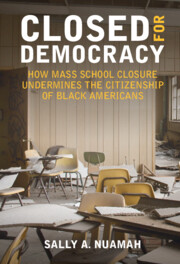Book contents
- Closed for Democracy
- Closed for Democracy
- Copyright page
- Epigraph
- Contents
- Figures
- Tables
- Acknowledgments
- Introduction: Closed for School, Open for Business
- 1 What Targeted Citizens Think
- 2 Who Targeted Citizens Blame
- 3 How Targeted Citizens Fight Back
- 4 Who Wins and Who Loses in the Era of Mass School Closures
- Conclusion: Closed for School, Closed for Democracy
- Epilogue: Close to Home
- Appendix
- Bibliography
- Index
4 - Who Wins and Who Loses in the Era of Mass School Closures
Toward a Theory of Collective Participatory Debt
Published online by Cambridge University Press: 11 March 2023
- Closed for Democracy
- Closed for Democracy
- Copyright page
- Epigraph
- Contents
- Figures
- Tables
- Acknowledgments
- Introduction: Closed for School, Open for Business
- 1 What Targeted Citizens Think
- 2 Who Targeted Citizens Blame
- 3 How Targeted Citizens Fight Back
- 4 Who Wins and Who Loses in the Era of Mass School Closures
- Conclusion: Closed for School, Closed for Democracy
- Epilogue: Close to Home
- Appendix
- Bibliography
- Index
Summary
Chapter 4 returns to the story of Ms. Leanne Woods from the Introduction and provides a clear example of the negative impact of school closure policy, even on those whose schools remain open. In the long term, communities targeted by public school closure lose faith in the political process as durably changing the status quo appears elusive. These negative perceptions have serious consequences because participation provides one of the only mechanisms in a democracy for poor citizens to have power. And yet, the inability of their participation to produce long-term change pushes those affected by the policy to disengage with politics altogether. This chapter conceptualizes this latter phenomenon as indicative of their “collective participatory debt” – a type of mobilization fatigue that transpires when citizens engaged in policy process are met with a lack of democratic transparency and responsiveness despite high levels of repeated participation – and raises serious questions about the utility of participating while poor and Black in American democracy.
- Type
- Chapter
- Information
- Closed for DemocracyHow Mass School Closure Undermines the Citizenship of Black Americans, pp. 109 - 133Publisher: Cambridge University PressPrint publication year: 2022

